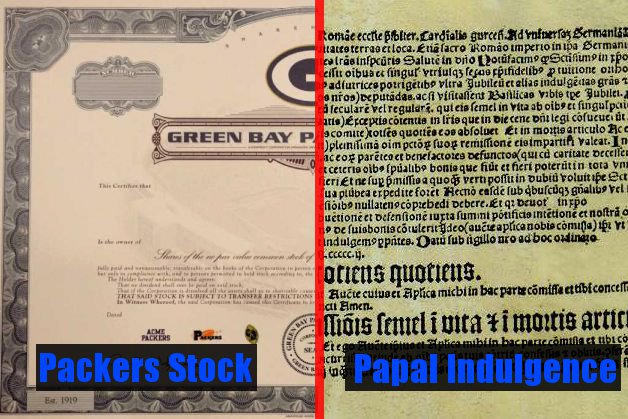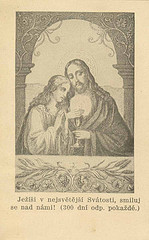To become a Saint, nothing more is needed than to gain all the indulgences we can. St. Alphonsus Marie Ligouri 1696-1787That quote is by my confirmation patron, St. Alphonsus Marie Ligouri. I chose him because I was a big Frank Zappa fan at the time and he seemed to be next best thing to St. Alphonso (of pancake breakfast fame). Choosing him, at the time, seemed to be the most naturally impious thing I could do. But, he did manage to have a lasting impression on me as his imprint, Ligouri Press, happens to publish the Catholic Catechism which I happened to notice one day in a second hand book store which I happened to purchase and read and quite naturally found myself agreeing with everything it said; I even agreed with the part about indulgences, which were one of the lightning rods of the Reformation:
What is an indulgence?
“An indulgence is a remission before God of the temporal punishment due to sins whose guilt has already been forgiven, which the faithful Christian who is duly disposed gains under certain prescribed conditions through the action of the Church which, as the minister of redemption, dispenses and applies with authority the treasury of the satisfactions of Christ and the saints.”
“An indulgence is partial or plenary according as it removes either part or all of the temporal punishment due to sin.” The faithful can gain indulgences for themselves or apply them to the dead.
CCC 1471
The topic of this month’s Eschewmenical query is Salvation and I aim to present an unadulterated Catholic view of the matter. I don’t aim to offend anyone, but this is one of the deeply divisive issues that we can’t exactly pretend don’t make or break our faiths, and I can’t much help it if I hold in antipathy the words of Martin Luther, who said, when justifying his addition of the word “alone” to his translation of the Bible that
If your papist wishes to make a great fuss about the word sola (alone), say this to him: “Dr. Martin Luther will have it so, and he says that a papist and a donkey are the same thing.”
That makes this papist cringe to think that the man who put the Luther in Lutheran couldn’t come up with a better argument than modus jerkface. I’d imagine Catholics have said some pretty rotten things about Protestants over the years, but at least our Popes attempt to write, if not act, in a demure fashion.
So, if we take it as a given that Martin Luther added “alone” to Romans 2:38 in his translation of the Bible, we certainly don’t see in these modern Protestant translations so why does anyone still think we’re saved by faith alone? Well, CARM has some good reasons. But, I’m not sure that any justification would be needed, if justification itself hadn’t been turned on it’s head by Luther by his insistence on faith alone in the first place.
Martin Luther clearly didn’t like indulgences, that was the start of his trouble. But, if you take everything about Catholicism and toss out indulgences, you still have the Catholic Church… For about 5-6 days, then the system runs out of capital and all hell breaks loose.
In a debased, and probably incorrect way, indulgences are spiritual stock. If the company goes bankrupt, stock certificates are not worth the paper they’re printed on. If one’s soul is not received in to purgatory or Heaven after death, then those indulgences can never be applied.
What Luther seemed to be against at first, the selling of indulgences, is – to me at least – more like what no sporting man from Wisconsin can be against. Purchased indulgences are to the medieval pious Catholic serf what Packers stock is to the modern secular football fan.
And, to illustrate my point, consider the benefits of each:
| Packers Stock | Papal Indulgence |
|---|---|
| Helps build new stadium | Helps build new church |
| Lasting memento of a seemingly pointless act | Lasting memento of a seemingly pious act |
| Better than paying more taxes for stadium upkeep | Better than paying more taxes for church upkeep |
| Probably more trouble than it’s worth to explain to the Bears fans | Definitely more trouble than it’s worth to defend to non-Catholics |
Today’s skeptic and yesterday’s reformer may have been against selling indulgences on principle. But, I think they gloss over how incredulous the medieval peasant would be about buying them. We peasants are, as a class, very tight with our money, but I think we would prefer to give it away, storing it where moths and bugs and stuff can’t get at it, than trade it for just a piece of paper. Purchasing indulgence must have been thought of as primarily alms giving and alms giving was one of the things mentioned in other books that got chucked by the reformation.
You will be storing up a goodly treasure for yourself against the day of adversity. For almsgiving delivers from death and keeps one from entering into Darkness. Tobit 4:8-10
As water quenches a flaming fire, so almsgiving atones for sins. Sirach 3:30
But one such quote (which just barely missed the chopping block), almost identical to what Tobias’s dad and Sirach’s son said was in Daniel:
Therefore, O king, may my advice be acceptable to you; atone for your sins by good deeds, and for your misdeeds by kindness to the poor; then your contentment will be long lasting.” Daniel 4:24
In any event, regardless of how useful I think selling indulgences was, and could yet be, the Church, in her wisdom has ceased to do so. She’s even cleaned up the lingo, as of 60 years ago, to make it so just plenary (total remission of punishment due to sin) and partial (partial remission of punishment) indulgences exist. Instead of:
- 50 days off purgatory for making the sign of the cross
- 100 days off purgatory for making the sign of the cross with Holy Water
- 200 days off purgatory for making the sign of the cross in a church with Holy Water
Nevertheless, these things still are partial indulgences, but there’s no need to be scrupulous about them any more. The mere existence of the Church’s teaching on indulgences assures one that good works one does to gain indulgences (whether one is aware of them or not) should never be in vain.
So much for works. Let’s concentrate on faith. Would it be wrong of me, as a Catholic, to say that it is faith in Jesus that saves us?
Nope, but that’s the beginning. But, like so many other beginnings, it’s really the most important part. We call it sanctifying grace; the grace brought on by Christ’s sacrifice which saves us. It’s not our doing, it’s not merely a result of our assent at Baptism, although that is then that it enters us forever. It is wholly beyond our comprehension, but it exists nevertheless.
Once baptized, the Christian enters a world where grace is necessary to move through life. Grace is spiritual grease.
Grace precedes, prepares and elicits our free response. CCCC 425
The freedom we gain through baptism is a freedom to be obedient to Christ. The freedom to follow the Law:
I will love You more than myself and myself only for Your sake; I will love all others in You and for You, as Your law of love commands; Imitation of Christ (Book 2 Chapter 5 Paragraph 6)
The New Law is mainly the same grace of the Holy Spirit which is given to believers in Christ. St. Thomas Aquinas
So, even when someone correctly interprets Galatians 2:16 and Romans 3:28 (which everyone seems to do) concerning justification through Faith vs Works of the Law. One can hardly say that for the Christian, to whom much has been revealed and much is expected, we are saved through works of the Law. Because our works are faith and our faith is works.
And to tie the point around to Catholicism, which is often criticized for adding too much work (Liturgy, by the way, is literally work of the people) to the requirements of the faithful, it is good to note that Catholic Church never claims to have discovered or created a more important commandment than “Love”.
But, in the end, it is God’s decision whether or not we shall be saved, not ours. Our knowledge of our faith can’t assure us a place in Heaven. Our knowledge of our good works can’t assure us of a place in Heaven. No amount of indulgences and no spiritual awareness can change that.
All we know is that the measure by which we measure will be measured out against us (Matt 7:2) and the heavenly house is very spacious (John 14:2). That it is better to be awake, prepared for the bridegrooms return than it is to be asleep at the wheel because not everyone who in their faith acknowledges God and cries Lord Lord who will, in the end, be known by God (Matt 25:1-13). It takes an insignificant amount of faith to move mountains (Matt 17:20). It was an ignoble work (Matt 26:49) which brought about the greatest test of faith God or man will ever know (Mark 14:34). But it was a simple yes (Luke 1:38), a work of faith, which brought in to being the greatest Man and God the world will ever know.
Filed under Uncategorized
Tagged: Catholicism, salvation







Did you post The Last Judgment for my sake? At any rate, it brings home the part that we can agree upon: God gets the final say. The problem with indulgences as I see it (and Luther would likely agree) is that, whatever the church professed, the practical result of selling them for many ordinary people was to signal that the church held the gun.
Luther was German, so we must forgive his foibles, just as we forgive Polish Popes and cheeseheads theirs. The one person we ought not be embarrassed to be associated with is, as you say, our Lord Jesus.
I think that’s the modern consensus, that selling of indulgences was some sort of power play on salvation by the church of the middle ages, but it’s based on the modern consensus that the serf of the middle ages was more superstitious (at least concerning the efficacy of a piece of paper) than we are today.
For instance, I wear a scapular, the scapular has a promise “whosoever dies wearing this scapular shall not suffer eternal fire”. I certainly hope in that promise and would do well to do my part to make up the other side of the promise, but I don’t base my entire faith off it, nor do I think that God would send me to hell (or that God sends anyone to hell who doesn’t show through their faith and works that that is their desired eternal residence) for dying without wearing my scapular.
I think I’ll try and crowdsource and answer to whether or not the medieval Catholic Church said that people who did not get indulgences were going to Hell.
Peter, this was an excellent post.
The more I learn about Catholic doctrine, the more I respect it. Indulgences aside, my view on salvation is actually very close to what you described here.
As a side note, most things I read by (or about) Luther make me chuckle. He was definitely ‘human’… :p
Thanks! Heh, the part about indulgences was pretty much to accentuate one of the most exceptional parts of Catholicism (as opposed to the various denominations I’m familiar with in the USA). I’d imagine if I’d had substituted the “corporal works of mercy” we’d be nearly wholly on the same page.
I enjoyed the letter I quoted there from Luther. When I had just read an excerpt I thought it was something that was misquoted, but when I read the whole thing I was astonished by his… humanity.